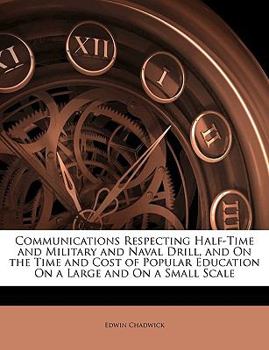Communications Respecting Half-Time and Military and Naval Drill, and on the Time and Cost of Popular Education on a Large and on a Small Scale
Select Format
Select Condition 
Book Overview
"Communications Respecting Half-Time and Military and Naval Drill, and On the Time and Cost of Popular Education On a Large and On a Small Scale" presents Edwin Chadwick's detailed observations and proposals concerning education and social reform in 19th-century England. Chadwick, a prominent social reformer, examines the efficacy of the 'half-time' system, which combined work and education for young people, and explores the integration of military and naval drill into educational curricula.
The book delves into the costs associated with various scales of popular education, providing a valuable insight into the economic considerations of implementing widespread educational programs. Chadwick's work reflects his commitment to improving social conditions through education and offers a historical perspective on the challenges and opportunities in shaping effective and affordable educational policies. This volume is essential for scholars and students interested in the history of education, social reform movements, and the development of public policy.
This work has been selected by scholars as being culturally important, and is part of the knowledge base of civilization as we know it. This work was reproduced from the original artifact, and remains as true to the original work as possible. Therefore, you will see the original copyright references, library stamps (as most of these works have been housed in our most important libraries around the world), and other notations in the work.
This work is in the public domain in the United States of America, and possibly other nations. Within the United States, you may freely copy and distribute this work, as no entity (individual or corporate) has a copyright on the body of the work.
As a reproduction of a historical artifact, this work may contain missing or blurred pages, poor pictures, errant marks, etc. Scholars believe, and we concur, that this work is important enough to be preserved, reproduced, and made generally available to the public. We appreciate your support of the preservation process, and thank you for being an important part of keeping this knowledge alive and relevant.
Related Subjects
History




